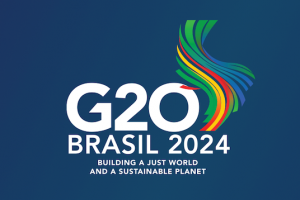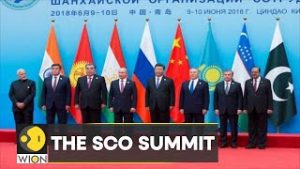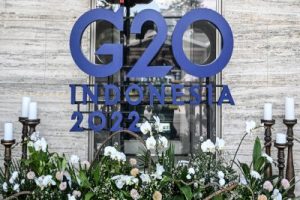 Who would think that the threat to the global order could emanate from global summitry leadership. But that appears to be a real possibility. Let me explain.
Who would think that the threat to the global order could emanate from global summitry leadership. But that appears to be a real possibility. Let me explain.
For some time now at CWD and the Global Summitry project (GSP) we have identified that sustaining global order requires the maintenance, even strengthening of a ‘single international community’. Stability cannot be sustained without such a community. Fragmentation hinders collaboration. But that single international community is being challenged today. The current wars in Europe and in the Middle East undermine a single international community. Rising geopolitical tensions between the leading powers, China and the United States, especially, erode it. Fragmentation then undermines stability of the order and diminishes, or eliminates, opportunities for advancing global governance. As described in the WPR Daily Review:
These tensions were underlined recently by statements from the President of Brazil, Luiz Inácio Lula da Silva, better known as Lula, now the host for this year’s G20. In an opinion piece he published in the Washington Post in January Lula described the impact of geopolitics and nationalism on global governance efforts:
The world is experiencing a contradictory moment today. Global challenges require commitment and cooperation among nations. We have never been so connected. At the same time, we are finding it increasingly difficult to dialogue, respect differences and carry out joint actions. Societies are taken over by individualism and nations are distancing themselves from each other, making it difficult to promote peace and face complex problems: the climate crisis; food and energy insecurity; geopolitical tensions and wars; the growth of hate speech and xenophobia.
Such a statement seems to suggest that Lula really gets it. Only a single international community can maintain a stable global order. But that may not be true. In fact Lula’s recent statements may be undermining such a goal. Why such statements are unclear. Some have suggested that he is determined to promote a different global order no longer dominated by the US and the West more broadly. Others focus on his imperatives in current domestic politics. Whatever. Nevertheless his recent comments over the War in Gaza may make it difficult to promote collective efforts in this critical Informal – the G20. One need only reference Lula’s view of Israel’s action in Gaza expressed by him in remarks at the African Union Summit Conference in Addis Ababa and reported in the NYTimes:
What is happening in the Gaza Strip with the Palestinian people has no parallel in other historical moments,” Lula told reporters during the 37th African Union Summit in Addis Ababa, Ethiopia. But, he then added, “it did exist when Hitler decided to kill the Jews.
And now as a result of these remarks his global summitry leadership efforts – and here I am focusing on his G20 efforts as the President – are being called into question. Rather than trying to knit the order together he apparently seems willing to fracture it.
Such a rupture of the international community is possible notwithstanding a promising start as G20 host. Indeed at the time of the transfer of hosting to Brazil, Lula set out important developmental priorities in a speech at the closing of the India G20 Summit. There he declared:
We are living in a world where wealth is concentrated. In which millions of people still go hungry. In which governance institutions still reflect the reality of the middle of the last century.
We will only be able to tackle all these problems if we address inequality.
Income inequality; inequality in access to healthcare, education and food; gender, race and representation inequality is behind all these anomalies.
If we want to make a difference, we must place the reduction of inequalities at the center of the international agenda.
Thus, Brazil’s G20 presidency will have three priorities:
(i) social inclusion and the fight against hunger;
(ii) energy transition and sustainable development in its three aspects (social, economic and environmental); and
(iii) reform of global governance institutions
All these priorities are contained in Brazil’s G20 presidency motto: “Building a fair world and a sustainable planet”
In advancing these priorities Lula announced that Brazil would establish two G20 Task Forces (TF) for the Brazil hosting year. These TFs will unite the Finance and Sherpa tracks in a concerted effort to advance global governance policy. The two are: the Global Alliance against Hunger and Poverty, and the Global Mobilization against Climate Change.
And in addition in the Concept Note Brazil also committed to the following:
Seeking to close this gap, Brazil plans to launch a G20 Initiative on Bioeconomy with the objective of deepening the international debate on the subject and of identifying potential avenues for cooperation in the area. The Initiative would be structured into three axes: (i) research, development, and innovation for bioeconomy; (ii) sustainable use of biodiversity for bioeconomy; and (iii) bioeconomy as an enabler for sustainable development. As a final result, the Initiative would be expected to produce a set of “High Level Principles on Bioeconomy.
All these priorities and institutional efforts require concerted collective action. Yet today all these promises seem to be in question over Lula’s statements on the current geopolitical crises, notwithstanding Lula’s injunction in his speech at the closing of the India G20 Summit that:
Thirdly, we cannot allow geopolitical issues to hijack G20 bodies’ discussion agendas. A divided G20 does not interest us. We can only tackle present day challenges through joint action.
Lula needs to heed his own words or he will find that his G20 leadership is undermined by his own words. Such words put at risk his determined collective priorities in the G20. They divide the international community putting at risk ‘a single international community’.
Image Credit : Brazil
This Post was first published at my Substack Alan’s Newsletter
https://open.substack.com/pub/globalsummitryproject/p/threatening-a-single-international?r=bj&utm_campaign=post&utm_medium=web&showWelcomeOnShare=true


